Are you a coffee aficionado in pursuit of the ideal pour-over brewer? Explore the showdown between Hario V60 vs Chemex.
Both require specific branded filters, but the Hario V60 is easier to clean and more portable.
Let’s dive deeper into these brewers to help you make an informed decision that will elevate your coffee game.
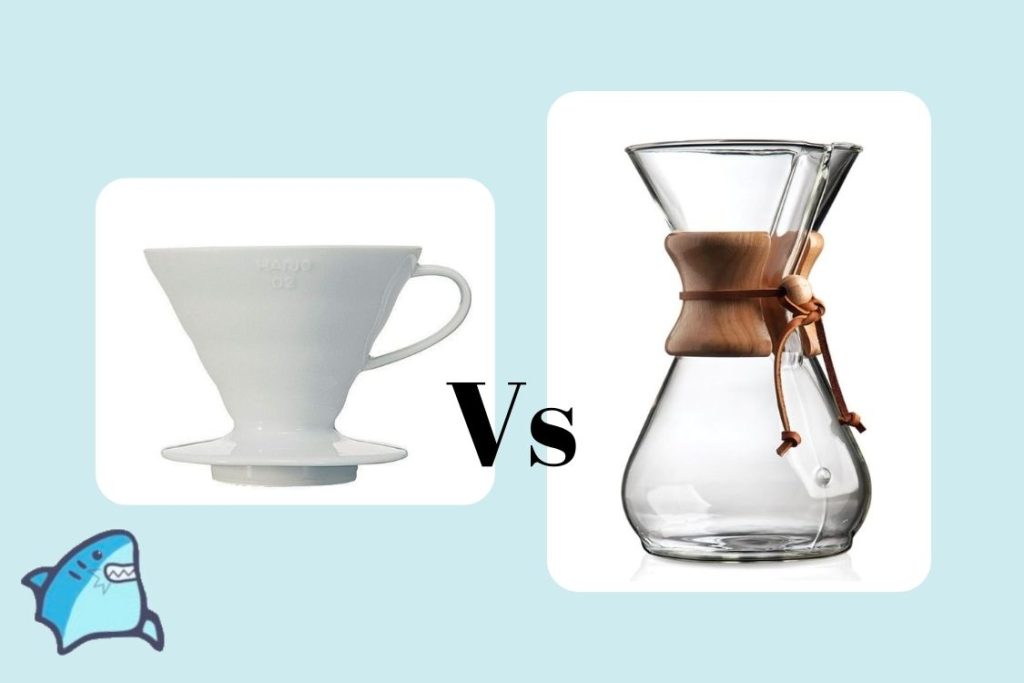
Key Takeaways
- Hario V60 has a cone-shaped design with various materials available.
- Hario V60 has unique spiral ridges and a single large hole for optimal extraction and control over water flow.
- Chemex has an elegant hourglass shape and is made of non-porous glass, with a thick paper filter for a clean cup of coffee.
- Brewing time and results differ between the two, with Hario V60 producing a bright and complex cup with a faster flow rate, while Chemex offers a
tea -like body with floral notes due to slower extraction.
Design and Build
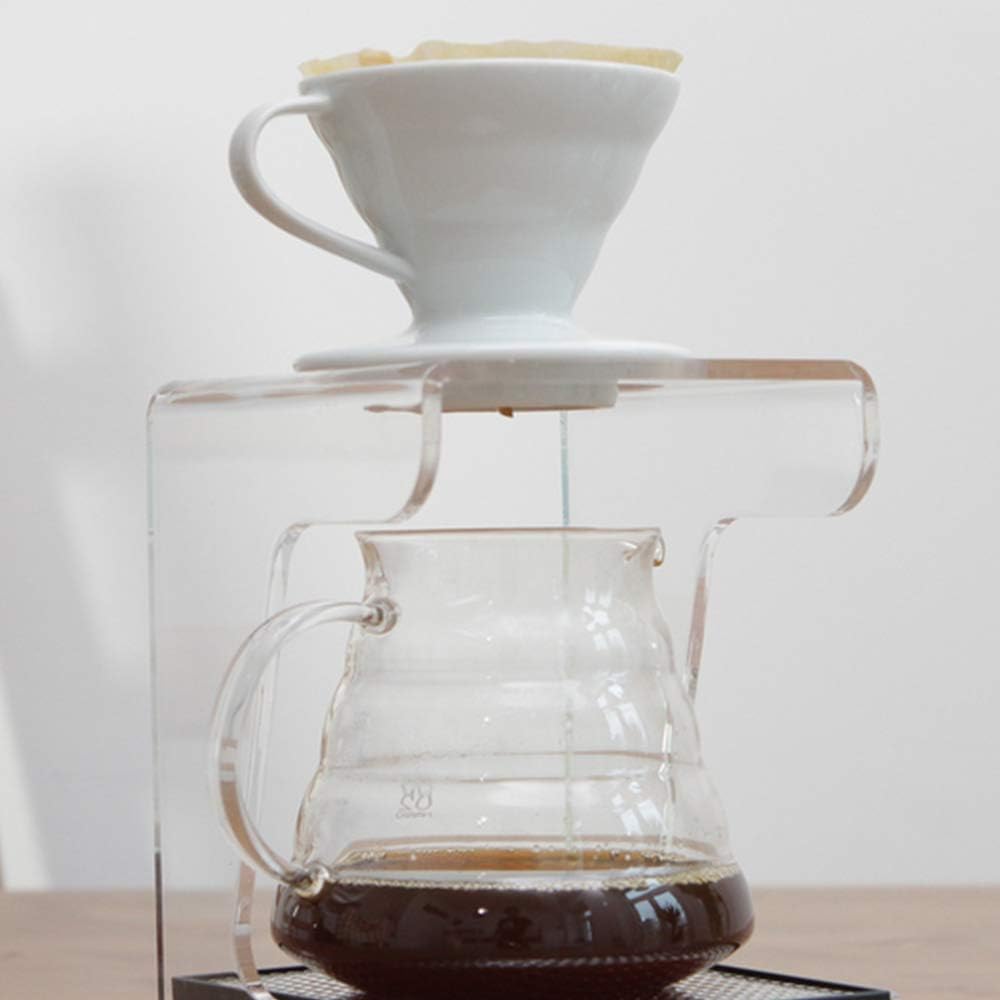

If you’re looking for a portable and easy-to-clean option, the Hario V60 is the way to go with its cone-shaped design. The Hario V60 brewer comes in various materials, such as ceramic, glass, plastic, or metal. Its unique shape and spiral ridges allow for optimal extraction and a deep, rich flavor profile. The single large hole in the bottom of the brewer provides great control over water flow and brewing time.
The Hario V60’s design also makes it incredibly easy to clean. Simply rinse it with warm water after each use, and it’s good to go for your next brewing session. Additionally, its compact size makes it perfect for traveling or taking on camping trips.
In terms of build quality, Hario V60 brewers are known for their durability. Whether you choose a ceramic or glass version, both options are sturdy and can withstand daily use without any issues. However, if you prefer something more lightweight and less prone to breaking, the plastic or metal versions might be better suited for you.
Overall, the Hario V60’s cone-shaped design offers portability and ease of cleaning while delivering exceptional coffee flavor. It’s a great option for those who value convenience without compromising on taste.
Brewing Process
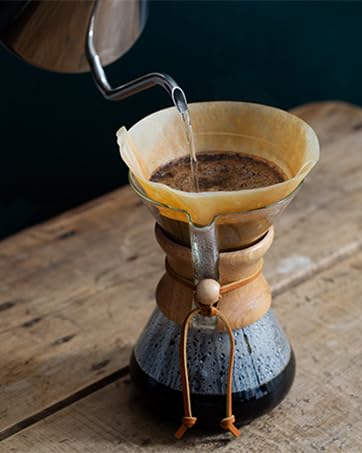

The brewing process for both options is easy to follow. Whether you choose the Hario V60 or the Chemex, making a delicious cup of pour-over coffee is within your reach.
Here are the steps for using the Hario V60 coffee maker:
- Place a paper filter in the cone and rinse it with hot water.
- Add your desired amount of coffee grounds.
- Slowly pour hot water over the coffee grounds in circular motions.
- Let the hot water drip into your cup.
- Utilize the spiral ridges and a single large hole on the bottom for flavor extraction.
- Enjoy your deep and rich coffee.
On the other hand, using a Chemex involves a slightly different process.
- Place a folded paper filter in the top portion of the Chemex.
- Ensure one side has three layers, and the other side has one layer.
- Rinse the filter with hot water to remove the paper taste and heat up the Chemex.
- Add coffee grounds to the filter.
- Slowly pour hot water over the grounds in a circular motion until it reaches your desired volume.
- Benefit from the Chemex’s hourglass shape for even extraction and excellent heat retention.
- Enjoy a clean and elegant brewing experience.
In the end, choosing between Hario V60 or Chemex depends on personal preferences and brewing needs. If you prefer a deeper flavor profile with a quicker brewing time, then go for the Hario V60. But if you’re more inclined towards a cleaner taste with a slower brew cycle, then Chemex is the way to go.
Whichever option you choose, both will produce a delicious cup of pour-over coffee that is sure to satisfy your caffeine cravings.
Brewing Time and Results
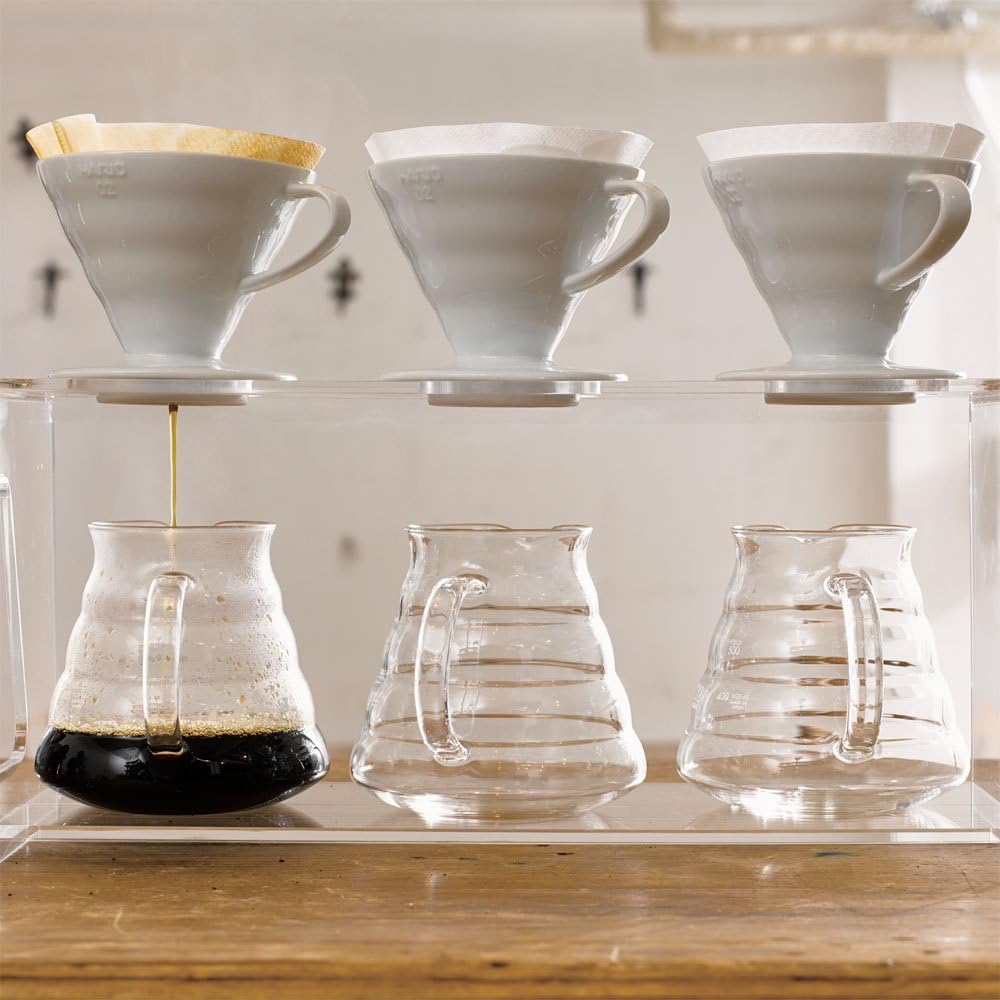

To achieve your desired brewing time and results, it’s important to consider your personal preferences when choosing between the Hario V60 and Chemex brewers.
The Hario V60 offers a brewing time of 2 to 4 minutes, while the Chemex takes slightly longer at 3 to 6 minutes. This difference in brewing time can affect the flavor profile of your coffee.
The Hario V60 produces a bright and complex cup with spiral ridges and a single large hole design. This allows for a faster extraction process, resulting in a vibrant and flavorful brew. On the other hand, the Chemex offers a
When it comes to choosing between these two brewers, you’ll need to think about what kind of coffee experience you prefer. If you enjoy brighter flavors and want your coffee ready quickly, then the Hario V60 may be the better option for you. However, if you appreciate a more mellow and nuanced cup with floral undertones, then the Chemex might be your go-to.
Ultimately, both brewers have their own strengths, and it all boils down to personal taste. Take some time to experiment with both methods and discover which one suits your palate best.
Filters
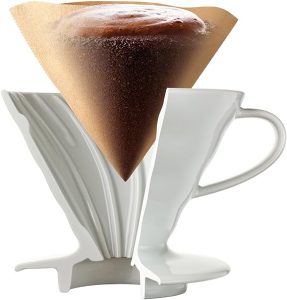
When choosing between the Hario V60 and Chemex brewers, it’s important to consider the specific branded paper filters required for each. The filter plays a crucial role in the flavor profile of your coffee, so it is worth considering these four key factors:
Thickness
Hario V60 filters are thinner compared to Chemex filters. Thinner filters allow more oils and sediments to pass through, resulting in a fuller-bodied cup with more pronounced flavors.
Flow Rate
Chemex filters are denser and have a slower flow rate compared to Hario V60 filters. This slower extraction process can lead to a cleaner cup with less bitterness.
Clarity
If you prefer a clean, bright cup of coffee, then Chemex filters are your best bet. They effectively remove fine particles and produce a sediment-free brew.



Konnichiwa! (Hello!) I'm Pat Tokuyama, a Japanese tofu cookbook author, who travels for music, food, and adventure. If you like Japanese tea, checkout some of the newestorganic japanese tea, matcha bowls and noren and more!
** Curious about the Plant Based Japanese Cooking Club? ** Learn more here!
Availability
While both brands offer their own branded filters, Hario V60 filters tend to be more widely available online and at local specialty coffee shops.
To sum it up, the choice between the Hario V60 and Chemex depends on your personal taste preferences. Consider how you like your coffee—bold or clean? Full-bodied or delicate? By understanding the differences in their respective paper filters, you can make an informed decision that suits your brewing needs perfectly.
Comparison of Hario V60 and Chemex
Primary Rating:
3.5 | Primary Rating:
3.5 |
Pros:
| Pros:
|
Cons:
| Cons:
|
$26.58
| $48.93
|
- Ensures consistent, well-balanced coffee in every cup.
- Japanese ceramic retains heat, crucial for maintaining ideal brewing temperatures.
- Stylish and adaptable to various kitchen styles.
- Allows for precise flavor adjustments with pour rate control.
- Handmade using 400-year-old Arita-yaki tradition in Japan.
- Ceramic can be delicate and may break if mishandled.
- Retained heat might extend brewing, not ideal for quick coffee.
- Quality craftsmanship often comes at a premium.
- Mastery needed for optimal brewing results.
- Simple, elegant design.
- High-quality, odor-free materials.
- Coffee can be refrigerated without flavor loss.
- Standardized 5 oz. cup measurement.
- Requires proprietary filters.
- Manual brewing can be time-consuming.
- Limited to smaller batch sizes.
- Fragile glass construction.
Hario V60 Vs Chemex: The Final Verdict


Regarding personal taste preferences, it all comes down to whether you prefer a fuller-bodied cup or a cleaner, brighter brew. The final verdict between the Hario V60 and Chemex ultimately depends on what kind of coffee experience you are seeking.
Let’s take a closer look at the differences between these two popular pour-over brewers:
| Hario V60 | Chemex | |
|---|---|---|
| Shape | Cone-shaped | Hourglass-shaped |
| Material | Ceramic, glass, plastic, or metal | Non-porous Borosilicate glass with a wooden collar and leather tie |
| Flavor Profile | Deep, rich flavor with spiral ridges | Clean and elegant brewing experience |
| Cleaning | Easier to clean | Requires more effort to clean |
| Portability | More portable | Less portable |
| Brewing Time | 2 to 4 minutes | 3 to 6 minutes |
If you enjoy a deep and rich flavor profile with complex notes, then the Hario V60 is the way to go. Its spiral ridges and single large hole allow optimal extraction, resulting in a fuller-bodied cup.
On the other hand, if you prefer a cleaner and brighter brew with a
Both brewers offer unique advantages and produce exceptional cups of coffee. It all boils down to your personal preferences for taste and brewing needs. So go ahead, pick your favorite pour-over brewer, and start enjoying an elevated coffee experience!


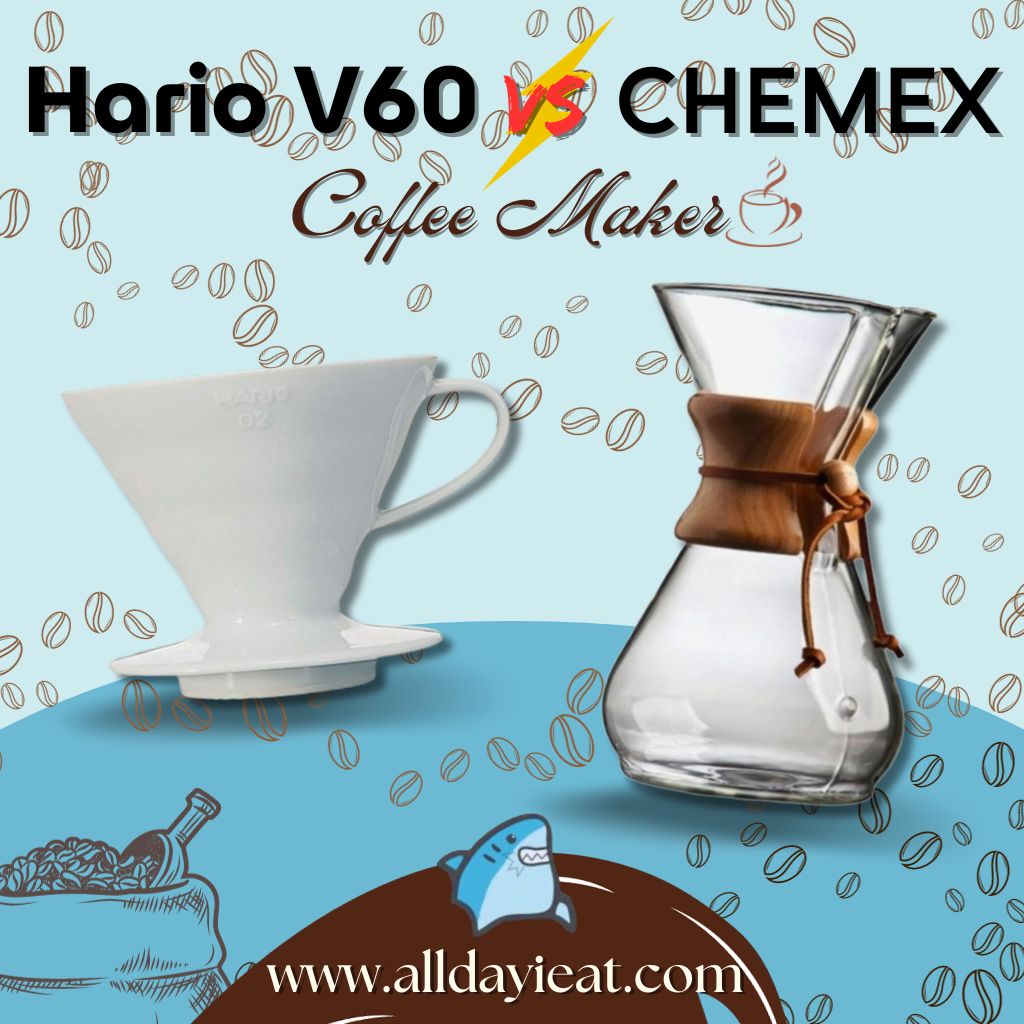

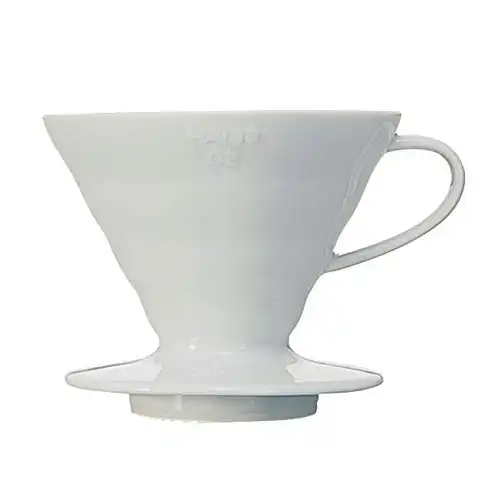


Konnichiwa! (Hello!) I'm Pat Tokuyama, a Japanese tofu cookbook author, who travels for music, food, and adventure. If you like Japanese tea, checkout some of the newestorganic japanese tea, matcha bowls and noren and more!
** Curious about the Plant Based Japanese Cooking Club? ** Learn more here!